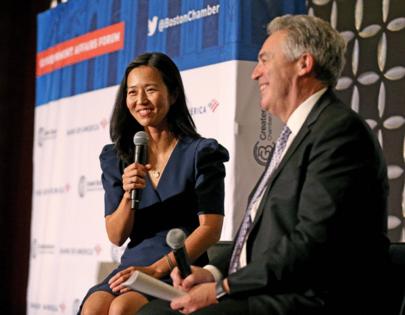Boston Chamber chief urges City Council to rein in Mayor Wu's spending amid economic uncertainty
Published in News & Features
BOSTON — The head of the Greater Boston Chamber of Commerce criticized the mayor’s decision to raise the city budget by 8% amid economic uncertainty while urging the City Council to practice “fiscal discipline” by making cuts to her spending proposal.
In a letter addressed to Councilors Brian Worrell and Enrique Pepén, chair and vice chair of a subcommittee overseeing the Council’s budget review process, Chamber CEO and President Jim Rooney urged all 13 councilors to keep budget growth to 3-4% for the next fiscal year that begins July 1.
That type of increase would be in line with inflation, Rooney wrote, and is more appropriate than the healthy budget growth Mayor Michelle Wu is proposing at a time when she is also seeking to raise commercial tax rates — a pending plan the Chamber “strongly opposes” — given “current revenue and economic uncertainty.”
“High interest rates and a burdensome regulatory process will slow commercial property growth this year, and federal pandemic assistance is no longer available to bolster the city’s finances,” Rooney wrote in the letter sent Wednesday. “The city should proceed cautiously as residents and businesses will bear the brunt of the resulting tax increases that may be necessary to match the proposed spending.
“I urge the (Council’s Ways and Means) committee to practice fiscal discipline as Boston navigates these challenges.”
In his written testimony, first reported by the Boston Globe, Rooney said the mayor’s proposed 8% spending increase of $344 million for fiscal year 2025 is higher than the two prior years, when spending increased by 6.8% and 5.9% in FY24 and FY23, respectively.
He urged the Council, which was granted the power to amend the mayor’s budget two years ago, to produce a plan with “modest spending growth” by identifying areas that can be cut while maintaining funding for core city services such as public schools and public safety.
Rooney also pointed to the state’s budget approach as being a potential model, in terms of it featuring modest growth of 3.6% while the Healey administration has implemented a hiring freeze “amid similar revenue uncertainty.”
The Chamber’s suggestions further include making a pitch for the mayor to offset a “dramatic increase” in residential taxes by dipping into the city’s nearly $1.2 billion budgetary reserve account and petitioning the state for a higher residential tax exemption, rather than raising commercial tax rates.
Rooney’s argument mirrors the findings of a report released last week by the Boston Municipal Research Bureau, which also advocated for responding to the city’s declining commercial tax base by cutting spending, utilizing budget savings, and petitioning the state for a new local tax to offset the city budget’s reliance on property taxes, which comprise more than 70% of annual revenue.
...continued
©2024 MediaNews Group, Inc. Visit at bostonherald.com. Distributed by Tribune Content Agency, LLC.







Comments